
Repentance is extremely important and valuable to the Christian soul, yet it is seldom preached about in churches these days. It leads us to recognize our dependence on God and that without Him, we cannot do anything that is of eternal value. Furthermore, it also helps us as a warning sign that we’re drawing far away from God.
In this way, repentance provides direction in our lives regarding our walk with God. It is a function of the working conscience. So if repentance is so valuable, why is it such a hard word? Recently, Bishop Emeritus Hwa Yung shared a tough but forthright message in Trinity Methodist Church on the subject matter.

Jesus’ Mission for the Lost
Bishop Hwa Yung shared that one of the most remarkable passage in the Bible was that of Zacchaeus’ story. This is found in Luke 19:1-9. Zacchaeus was a tax-collector, and during that time, no one was hated more than them. The tax-collectors were notorious for being cheats and for being corrupted. What’s worse, they worked for the enemy; the very people who were oppressing the Jews.
Yet, what Jesus did was remarkable. Jesus was concerned about the life of Zacchaeus. Against all the murmurs of the crowd around Him, He went to the house of the tax-collector as a guest. Jesus was not just trying to create controversy; He was concerned about Zacchaeus as a person and for his salvation.

Zacchaeus’ turn-around was noteworthy. He gave half of all his property to the poor, and returned four-fold the money that he might have cheated from others. In Luke 19:9, Jesus declares that “today salvation has come to this house”, suggesting that Zacchaeus’ repentance and transformation is shown by his desire to make right his past wrongs. But why are such testimonies hardly ever heard, if at all, today?
This is the nature of true repentance and it is important to every follower of Christ. Jesus is unchanging; then and now He remains the same. He was not concerned about niceties or self-righteousness; He was concerned about the human soul and the salvation of the lost and repentance is an important element in that process.
The Enemy of Christians
All Christians have a common enemy and his name is satan. One of the common strategies that the devil will use against the people of God is to draw them away from Him through the lure of the world, symbolized by money, sex, and power. Yet John Wesley recognized the inherent dangers, and he made holiness the center of his life.

Bishop Hwa Yung shared that it is undeniable that money and such is necessary for life; it is the purpose we work everyday. However, we also need to practice discernment and moderation. The Christians of the Early Church were not rich yet they grew rapidly. They had an understanding of their identity as a people of God.
God is very serious about repentance. In Jeremiah 2:23-24, God used strong words against the Jews of Jeremiah’s day that were living in hypocrisy and sin, and Jeremiah wept for Israel. Bishop Hwa Yung communicated that amidst today’s obsession with numbers, we need to return back to the fundamentals. Among these fundamentals is the meaning of repentance.
Repentance Is Concrete
In the early chapters of the Gospels, we read about John the Baptist’s ministry. He was preaching to the Jews about the coming of the Messiah and for their need to prepare their spirits to receive Him (Luke 3:4-7). This was a matter of the heart for the One who was returning was the King of the Jews. Repentance cuts into the heart. This theme runs throughout the Bible, and today, we are waiting for Christ’s Second Coming. This time, it is for every Christian.

As Christians, we ought to bear fruit and in fact three of the Gospels gave very strong warning about this (Matthew 7:19; Luke 13:9; John 15:2); God will cut down trees that bear no fruit. When we ask for the Holy Spirit to come and demand revival, do we really understand what we are demanding? The Holy Spirit blesses but He is also an agent of cleansing and we’ll be baptized as in fire. He is going to burn all the chaff (unrighteousness) off us and it may not be pleasant but it is essential. Are we prepared when He comes?
Bishop Hwa Yung communicated that trouble inevitably ensues if we try to take short-cuts in our relationship with God instead of paying attention to the basics. Repentance has a fundamental purpose for it helps us to build up strong foundations. So the concern becomes “What shall we do as a people of God?”

Repentance is holistic, Bishop Hwa Yung imparted. It is more than the physical. Repentance even brings the healing touch of the Lord in many cases. It helps us to let go of our addictions, release us from bondages of bitterness and hurts, guides us to return to the Lord and directs our lives daily. We need to repent and return back to God.
Why is Repentance a Hard Word?
Repentance is an important thing but it is also very hard. Even leaders find it difficult to say sorry when they made mistakes. And very often saying sorry becomes a mere utterance rather than really coming from the heart. However, the fact is such obduracy always has consequences. It messes up lives, families, communities, even whole societies. Bishop Hwa Yung counseled that we need to settle the issue deep down in our hearts.

So why is it that repentance is such a hard word? 4 reasons were given:
-
The Controlling Lure of the World: The lure of the world can be powerful and many people find it hard to let go of their addictions to the things of the world (power, materialism, etc..) -
The human nature (human flesh) is weak: This is a central concept to Christianity. We recognize that when Adam sinned against God, it tainted the human race with sin and weakness. We have a built-in propensity to do things that are morally wrong (original sin) and everything that we do, despite our best efforts, are tainted by sin (total depravity). -
Prone to self-deception: Because of the weakness of the human flesh, we are also prone to self-deception. We think we are doing good works, but we seldom examine the reasons we are doing them. For instance, is it for the praise from the world or is it really for the glory of God? -
Pride: And all this leads to pride, the heart of the problem. We are afraid of letting go our pursuit of money or power and turning back to God even when it is time we need to, and we think that everything is alright and that there is nothing in us that needs forgiveness.
‘If we really want to see God, we need to walk in His ways. Repentance and atonement is a daily process,’ Bishop Hwa Yung imparted.

The Central Question
There is a central question that every Christian need to ask ourselves; ‘Are we ready to receive the King of kings when He returns? What shall we do?’’
Bishop Hwa Yung put forward four counsels:
-
We need to go back to the Word of God. Learn to read His Word and listen to His voice. The Holy Spirit is there to guide us through everyday. -
We need to guard against the seduction of the world: It is not how we fall; it is how we get up and move forward. -
We need to recognize the weakness of the flesh: Learn to spend time alone with God. Many people find it difficult to do so because they are afraid of facing the silence of their own hearts. But how are we going to face Christ if we are even afraid of our own hearts? -
We need to be accountable to each other: If there is someone we ought to say sorry to or forgive, do it for our own sakes and to honour Christ.
|Share The Good News|
– Jason Law




Sometimes, repentance involves a drastic change at great personal cost:
“Many who became believers confessed their sinful practices. A number of them who had been practicing sorcery brought their incantation books and burned them at a public bonfire. The value of the books was several million dollars” (Acts 19:18-19). We need to be reminded of the words of John the Baptist: “Prove by the way you live that you have repented of your sins and turned to God” (Matthew 3:8).
http://bit.ly/1k61NQt
This is a prophetic message to the LORD’s people of this times who are rebellious and lukewarm like the Israelite of OT days. The worst thing that could happen to a church is having a form of godliness but denying its power.
His kindness leads to our repentance (Ro 2:4). By showing kindness – the fruit of repentance to others (Gal 5:22-23), we’ve taught others how to obey – how to take heed of Mt 28:19-20. In essence, each of us busy doing his homework first – any teacher will be happy to see those kind of students.
Regards